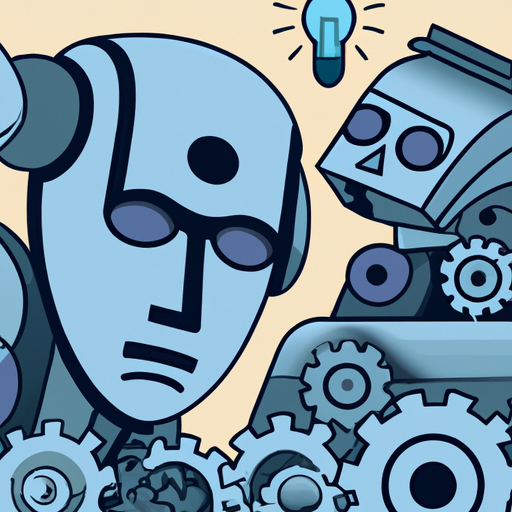
The Impact of AI on Employment: Will Robots Take Our Jobs?
-
Table of Contents
- Introduction
- Exploring the Potential of AI to Create New Job Opportunities
- Examining the Impact of AI on Job Security and Job Loss
- Assessing the Impact of AI on Wages and Working Conditions
- Analyzing the Impact of AI on the Future of Work
- Investigating the Role of Government in Regulating AI and Employment
- Conclusion
“Unlock the Future: Discover How AI Will Impact Employment and Your Career!”
Introduction
The Impact of AI on Employment: Will Robots Take Our Jobs? is a timely and important question that has been on the minds of many people in the modern world. With the rapid advancement of artificial intelligence (AI) technology, it is becoming increasingly clear that AI will have a significant impact on the way we work and the types of jobs available in the future. This article will explore the potential implications of AI on employment, including the potential for robots to take our jobs, the potential for job displacement, and the potential for new job opportunities. It will also discuss the potential for AI to create new types of jobs and the potential for AI to improve existing jobs. Finally, it will discuss the potential for AI to create new types of work and the potential for AI to create new types of businesses.
Exploring the Potential of AI to Create New Job Opportunities
The potential of Artificial Intelligence (AI) to create new job opportunities is an exciting prospect. AI has the potential to revolutionize the way we work, allowing us to automate mundane tasks and free up our time for more creative and meaningful work. AI can also help us to identify new opportunities and create new products and services that can benefit society.
AI can be used to automate mundane tasks, such as data entry and customer service. This can free up time for employees to focus on more creative and meaningful work. AI can also be used to identify new opportunities and create new products and services. For example, AI can be used to analyze large amounts of data to identify trends and patterns that can be used to create new products and services.
AI can also be used to improve existing products and services. For example, AI can be used to analyze customer feedback and identify areas for improvement. This can help companies to create better products and services that are more tailored to customer needs.
AI can also be used to create new job opportunities. For example, AI can be used to create new roles such as data scientists, AI engineers, and AI strategists. These roles require specialized skills and knowledge, and can provide a valuable source of employment for those with the right skills.
In conclusion, AI has the potential to create new job opportunities and revolutionize the way we work. AI can be used to automate mundane tasks, identify new opportunities, and create new products and services. It can also be used to improve existing products and services, and create new roles that require specialized skills and knowledge. As AI continues to develop, it is likely that it will create even more job opportunities in the future.
Examining the Impact of AI on Job Security and Job Loss
The advent of artificial intelligence (AI) has had a profound impact on the job market, raising questions about job security and job loss. AI has the potential to automate many tasks that were previously done by humans, leading to fears that it could lead to large-scale job losses. However, it is important to understand the full implications of AI on job security and job loss before drawing any conclusions.
AI is a form of technology that enables machines to perform tasks that were previously done by humans. AI can be used to automate a wide range of tasks, from customer service to data analysis. This automation has the potential to reduce the need for human labor, leading to fears that it could lead to large-scale job losses.
However, it is important to understand that AI is not a replacement for human labor. AI can be used to automate certain tasks, but it cannot replace the creativity and problem-solving skills of humans. In fact, AI can be used to augment human labor, allowing humans to focus on more complex tasks. This could lead to an increase in job security, as AI can free up humans to focus on more complex tasks that require more skill and expertise.
In addition, AI can also create new jobs. AI can be used to automate certain tasks, freeing up humans to focus on more complex tasks. This could lead to an increase in job opportunities, as AI can create new roles that require more skill and expertise.
Overall, it is important to understand the full implications of AI on job security and job loss before drawing any conclusions. While AI has the potential to automate certain tasks, it cannot replace the creativity and problem-solving skills of humans. In addition, AI can also create new jobs, leading to an increase in job opportunities. Therefore, it is important to consider the full implications of AI on job security and job loss before drawing any conclusions.
Assessing the Impact of AI on Wages and Working Conditions
The advent of artificial intelligence (AI) has had a profound impact on wages and working conditions. AI has enabled businesses to automate many processes, resulting in fewer jobs and lower wages for workers. In addition, AI has enabled businesses to reduce the number of hours worked by employees, resulting in fewer hours of work and lower wages.
AI has also had an impact on working conditions. AI-driven automation has enabled businesses to reduce the number of employees needed to perform certain tasks, resulting in fewer opportunities for workers to interact with each other and fewer opportunities for workers to develop their skills. This has led to a decrease in job satisfaction and an increase in job insecurity.
The impact of AI on wages and working conditions has been particularly pronounced in the manufacturing sector. Automation has enabled businesses to reduce the number of workers needed to produce goods, resulting in fewer jobs and lower wages. In addition, automation has enabled businesses to reduce the number of hours worked by employees, resulting in fewer hours of work and lower wages.
The impact of AI on wages and working conditions has also been felt in the service sector. Automation has enabled businesses to reduce the number of employees needed to perform certain tasks, resulting in fewer opportunities for workers to interact with each other and fewer opportunities for workers to develop their skills. This has led to a decrease in job satisfaction and an increase in job insecurity.
The impact of AI on wages and working conditions is likely to continue in the future. As AI technology advances, businesses will be able to automate more processes, resulting in fewer jobs and lower wages for workers. In addition, AI-driven automation will enable businesses to reduce the number of hours worked by employees, resulting in fewer hours of work and lower wages.
It is important for businesses to consider the impact of AI on wages and working conditions when making decisions about automation. Businesses should ensure that automation does not lead to a decrease in job satisfaction or an increase in job insecurity. In addition, businesses should ensure that automation does not lead to a decrease in wages or an increase in the number of hours worked by employees.
Analyzing the Impact of AI on the Future of Work
The advent of artificial intelligence (AI) has revolutionized the way we work and live. AI has the potential to drastically change the future of work, and its impact is already being felt in many industries. AI can automate mundane tasks, improve decision-making, and increase efficiency. It can also create new jobs and opportunities for workers.
AI can automate mundane tasks, freeing up workers to focus on more complex and creative tasks. This can lead to increased productivity and efficiency, as well as improved customer service. AI can also be used to analyze large amounts of data, allowing businesses to make better decisions and gain insights into their operations. AI can also be used to automate customer service, allowing businesses to respond to customer inquiries quickly and accurately.
AI can also create new jobs and opportunities for workers. AI can be used to develop new products and services, as well as to create new markets. AI can also be used to develop new skills and capabilities, allowing workers to stay competitive in the job market.
However, AI can also lead to job displacement. Automation can reduce the need for certain types of jobs, such as manual labor or data entry. This could lead to increased unemployment and a decrease in wages for certain types of workers.
Overall, AI has the potential to drastically change the future of work. It can automate mundane tasks, improve decision-making, and create new jobs and opportunities. However, it can also lead to job displacement and decreased wages for certain types of workers. It is important for businesses to consider the potential impacts of AI on their operations and workforce before implementing it.
Investigating the Role of Government in Regulating AI and Employment
The role of government in regulating artificial intelligence (AI) and employment is becoming increasingly important as AI technology advances. AI has the potential to revolutionize the way we work, but it also has the potential to disrupt the labor market and displace workers. As such, governments must take a proactive role in regulating AI and employment to ensure that the benefits of AI are shared equitably and that workers are protected from potential harms.
First, governments must ensure that AI is used responsibly and ethically. This includes developing regulations that ensure AI is used in a way that is transparent and accountable, and that it does not discriminate against certain groups of people. Governments should also ensure that AI is used to augment, rather than replace, human labor. This could include regulations that limit the use of AI for certain tasks, or that require companies to provide training and support for workers who are displaced by AI.
Second, governments must ensure that workers are protected from potential harms caused by AI. This could include regulations that require companies to provide retraining and job placement services for workers who are displaced by AI, or that require companies to provide severance packages for workers who are laid off due to AI. Governments should also ensure that workers are adequately compensated for their work, and that they are provided with adequate safety and health protections.
Finally, governments must ensure that the benefits of AI are shared equitably. This could include regulations that require companies to share the profits generated by AI with their workers, or that require companies to invest in training and development programs for workers who are displaced by AI. Governments should also ensure that AI is used to create new jobs, rather than simply replacing existing ones.
In conclusion, the role of government in regulating AI and employment is becoming increasingly important as AI technology advances. Governments must take a proactive role in regulating AI and employment to ensure that the benefits of AI are shared equitably and that workers are protected from potential harms. By doing so, governments can ensure that AI is used responsibly and ethically, and that the benefits of AI are shared equitably.
Conclusion
The Impact of AI on Employment is a complex issue that requires careful consideration. While it is true that AI has the potential to automate certain jobs, it is also true that AI can create new jobs and opportunities. Ultimately, the impact of AI on employment will depend on how it is used and how it is regulated. It is important to ensure that AI is used responsibly and ethically, and that the benefits of AI are shared equitably. With the right policies in place, AI can be a powerful tool for creating new jobs and opportunities, while also helping to reduce the burden of manual labor.








